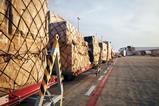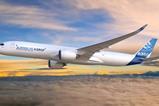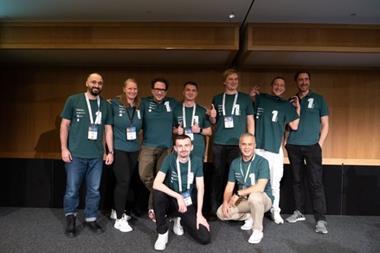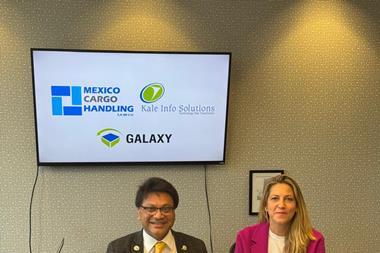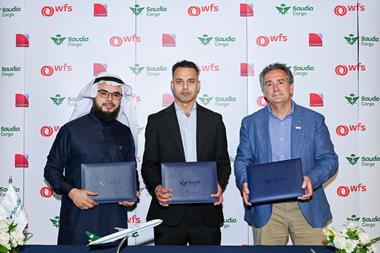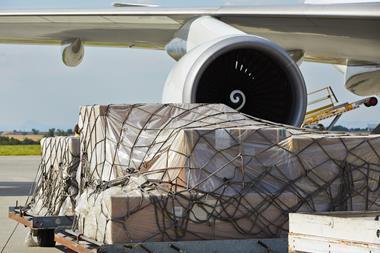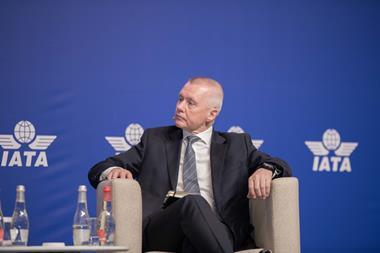
Collaborative open source implementation is key for future air cargo data sharing, says the Open Logistics Foundation and IATA.
The Open Logistics Foundation, a European organisation that focuses on developing open-source solutions, and trade association, IATA are cooperating to advance digitalisation in airfreight with the NE:ONE server project.
The open source software NE:ONE, developed with support from Germany’s Federal Ministry of Digital and Transport, aims to facilitate the implementation of seamless data exchange based on IATA ONE Record data sharing standard across the industry.
As the project moves from concept to practice, Working Group Digital Air Cargo is actively seeking airline partners to test and deploy the system. This initiative offers a unified solution for all stakeholders.
Airfreight is not yet extensively digitalised. The sector continues to rely on paper-based systems or outdated digital standards, leading to inefficient transit times. To address these issues, IATA and the Open Logistics Foundation are working together to promote the use of open source solutions for the exchange of airfreight data based on ONE Record.
Their collaboration focuses on the NE:ONE server, which was developed by Digital Testbed Air Cargo (DTAC), a research project with funding from Germany’s Federal Ministry for Digital and Transport (BMDV) that examines the basics for operating digital solutions in air cargo.
The NE:ONE server functions as a data hub based on the IATA ONE Record standard for data sharing in airfreight. Hosted by the Open Logistics Foundation with a permissive and specific license, this open source code is made publicly available to ensure it is permanently available beyond the project’s duration.
Advancing digital air cargo through NE:ONE
Within the Foundation, Working Group Digital Air Cargo has been formed under the lead of Oliver Ditz, project manager and research associate at Fraunhofer Institute for Material Flow and Logistics (Fraunhofer IML).
The institute is tasked with advancing research and development in logistics and material flow. Under the lead of Fraunhofer IML, that initiated the implementation of NE:ONE, the industry-driven and non-competitive working group focuses on implementing the ONE Record standards for data exchange between the various players in air transport on an open source basis.
The working group meets on a monthly basis, fostering ongoing exchange among participants. The current project of the working group is NE:ONE. This open source software package implements the data model and API specifications of the IATA ONE Record standard for air freight. NE:ONE enables the operation of a ONE Record server, allowing seamless participation in data exchange.
Any party can host a ONE Record server and use it to provide and exchange data with partners and customers according to the ONE Record data sharing standard. To make the local implementation of the ONE Record standard as accessible as possible, the NE:ONE server software is available to the public for free as open source software.
In order to define and promote a common standard, interaction in the cooperation between the Open Logistics Foundation and IATA is important. The Open Logistics Foundation drives the realisation, i. e. the implementation, while IATA defines the standard.
During implementation, aspects of the standard are naturally identified that may need to be adapted. “Our focus is to support and promote the continuous evolution and improvement of the NE:ONE server,” said Henk Mulder, head of digital cargo at IATA. “This initiative embodies the power of collaborative innovation, making both organizations essential for maintaining an up-to-date standard.”
Moving from Concept to Practice
During the recent IATA Hackathon in Shenzhen, China, in March 2024, NE:ONE served as the foundational infrastructure for most of the hackathon teams. The NE:ONE server is proven to be ready, so the focus now shifts to practical application.
The next step is to test the model on a larger scale, implementing use cases to transition into real-world operations. The Working Group welcomes airlines willing to participate as partners for this implementation. A regular exchange between the IATA and Working Group Digital Air Cargo is planned to be established.
Without a unified approach, as the Open Logistics Foundation is aiming for, each airline and network participant develops their own independent implementation, likely leading to incompatibilities.
“With numerous individual implementations, each stakeholder bears the effort, costs and risks alone. A common standard, on the other hand, serves as the core of collaboration while at the same time being more efficient and easier to update than individual implementations,” said Andreas Nettsträter, chief executive of the Open Logistics Foundation. “A common code base ensures seamless collaboration and functionality for all parties involved while also significantly reducing costs.”
Members of the Working Group
Dachser, DB Schenker, DHL, Fraunhofer IML (Working Group lead), logistics.cloud, Rhenus. The Working Group is open to new members and more information can be found here.







